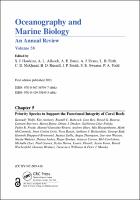Chapter 5 Priority Species to Support the Functional Integrity of Coral Reefs
Proposal review
Author(s)
Wolfe, Kennedy
Anthony, Ken
Babcock, Russell C.
Bay, Line
Bourne, David G.
Burrows, Damien
Byrne, Maria
Deaker, Dione J.
Diaz-Pulido, Guillermo
Frade, Pedro R.
Gonzalez-Rivero, Manuel
Hoey, Andrew
Hoogenboom, Mia
McCormick, Mark
Ortiz, Juan-Carlos
Razak, Tries
Richardson, Anthony J.
Roff, George
Sheppard-Brennand, Hannah
Stella, Jessica
Thompson, Angus
Watson, Sue-Ann
Webster, Nicole
Audas, Donna
Beeden, Roger
Carver, Jesseca
Cowlishaw, Mel
Dyer, Michelle
Groves, Paul
Horne, Dylan
Thiault, Lauric
Vains, Jason
Wachenfeld, David
Weekers, Damien
Williams, Genevieve
Mumby, Peter J.
Language
English[eng]Abstract
Ecosystem-based management on coral reefs has historically focused on biodiversity conservation through the establishment of marine reserves, but it is increasingly recognised that a subset of species can be key to the maintenance of ecosystem processes and functioning. Specific provisions for these key taxa are essential to biodiversity conservation and resilience-based adaptive management. While a wealth of literature addresses ecosystem functioning on coral reefs, available information covers only a subset of specific taxa, ecological processes and environmental stressors. What is lacking is a comparative assessment across the diverse range of coral reef species to synthesise available knowledge to inform science and management. Here we employed expert elicitation coupled with a literature review to generate the first comprehensive assessment of 70 taxonomically diverse and functionally distinct coral reef species from microbes to top predators to summarise reef functioning. Although our synthesis is largely through the lens of the Great Barrier Reef, Australia, a particularly data-rich system, it is relevant to coral reefs in general. We use this assessment to evaluate which taxa drive processes that maintain a healthy reef, and whether or not management of these taxa is considered a priority (i.e. are they vulnerable?) or is feasible (i.e. can they be managed?). Scientific certainty was scored to weight our recommendations, particularly when certainty was low. We use five case studies to highlight critical gaps in knowledge that limit our understanding of ecosystem functioning. To inform the development of novel management strategies and research objectives, we identify taxa that support positive interactions and enhance ecosystem performance, including those where these roles are currently underappreciated. We conclude that current initiatives effectively capture many priority taxa, but that there is significant room to increase opportunities for underappreciated taxa in both science and management to maximally safeguard coral reef functioning.
Keywords
Volume, Todd, Swearer, Smith, S, Russell, Review, P, OMBAR, Oceanography, Marine, L, I, Hawkins, Firth, Evans, Biology, Bates,B, Annual, AllcockISBN
9780367367947, 9780429351495, 9780367524722Publisher
Taylor & FrancisPublisher website
https://taylorandfrancis.com/Publication date and place
2020Imprint
CRC PressClassification
Marine biology


 Download
Download